Page from the PastJune 01, 2011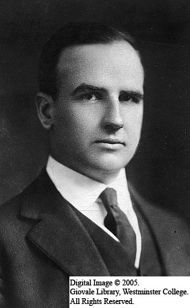
As we celebrate our 82nd Commencement, we reflect back to Westminster's First Commencement Address, given by Dr. Clarence Edward Macartney (pictured), May 6, 1930 Below appears the complete text of the address delivered at the First commencement of Westminster Theological Seminary, Philadelphia, in Witherspoon Hall, on the evening of May sixth. Dr. Macartney is an ex-Moderator of the General Assembly, Minister of the First Presbyterian Church, Pittsburgh, and member of the Seminary's Board of Trustees. An account of the commencement exercises is recorded here. This transcript is courtesy of the blog: The Continuing Story Were I to consult my own preference, I should avail myself of this opportunity to speak some words of counsel, warning, and encouragement to the young men who are going out from this Seminary to preach the Gospel. But I am aware, as you are, that this is no ordinary occasion, and that the exercises of this evening have back of them a deeper significance than the sending out of these young men into the work of the ministry. Tonight we fling out to every wind that blows a new banner, to be displayed not because of any new discovery, or any new faith, but because of the Everlasting Gospel. With this commencement, and the going out of these young men into the ministry, the real history of Westminster Seminary begins. One hundred and fifty-four years ago, the Continental Congress, assembled in the old State House on Chestnut Street, declared to the world the independence of the United States. It was fitting that the Declaration should commence with the now familiar words: “When in the course of human events it becomes necessary for one people to dissolve the political bands which have connected them with another, and to assume among the powers of the earth the separate and equal station to which the laws of nature and of nature’s God entitles them, a decent respect to the opinions of mankind requires that they should declare the causes which impel them to separation.” A decent respect to the opinions of Presbyterians, and evangelical Christians in the United States and throughout the world, requires that we should declare the causes which impelled us to separate from Princeton Theological Seminary. A statement of these causes must, of necessity, embrace a brief survey of the present conditi Four centuries have passed since Luther nailed his Theses to the door of the Cathedral at Wittenberg and since John Calvin came to Geneva and inaugurated the great work which made Geneva the cradle of the reformed theology and the “fertile seed-plot of democracy.” But what of Protestantism today? As I gazed earnestly and reminiscently upon the memorial to our spiritual forefathers, the vagrant August wind was blowing the yellow leaves about the gardens, telling me that the end of the summer was at hand. Has the Protestant Church, which we and our fathers before us took to be a Tree of Life, whose leaf could never wither, come to its sere and yellow leaf? Is its grandeur and glory only in the past, and in those mighty forces which it loosed upon the world to sweep away hoary iniquities and superstitions in Church, in State, and in human society? Must we liken Protestantism to a vast scaffolding upon which have stood the workers and toilers and dreamers, as the temple of religious and political liberty rose towards the sky through their labors, but which, now that the building is finished, is to be taken down and carried away? Has the inexorable hand which has spelled the passing of so many of the kingdoms and societies of mankind now appeared to write upon the wall of Protestant Christianity, “Thou art weighed in the balance and found wanting?” At first, these questions may startle and sadden earnest evangelical Protestants. But, upon sober second thought, it must be evident to all that a great change has come over the Protestant Church, and that a still greater change is in process. One of our university presidents said recently, “I do not know where Protestantism is going. Nobody knows.” Everyone, however, seems to have the impression that Protestantism is on the tide of change, and is going — somewhere. In the first book of his Commentaries, Caesar describes a river of Switzerland called the Saone, which, he says, “flows through the territories of the Aedui and Sequani into the Rhone with such incredible slowness that it cannot be determined by the eye in which direction it flows.” Sometimes, the process of transition is so slow that it escapes observation. Again, there are other times when the stream of change flows with tremendous rapidity, so rapid, indeed, that although one knows the river is going in some direction, one cannot tell what that direction is. There may be those who stand in honest doubt as to the present drift and current in the Protestant Church. But there are a great number who are convinced that Protestant Christianity is rapidly being carried away towards what Newman called, “a bottom-less liberalism of thought.”
The ultimate question of all religion is this, — Has God come out of the darkness and silence and spoken to man? The answer of the Protestant Church, indeed, of the whole Church catholic, has been that God has so spoken, and that in the Scriptures of the Old and New Testament we have an infallible record of that revelation. In the Protestant Church we have emphasized the divine origin, and therefore the complete authority of the Scriptures, their sufficient clarity, and their finality. But who today would claim that those principles represent the popular Protestant thought of the Bible? Certainly they do not, if we can pay any regard to the utterances in Protestant pulpits, seminaries, colleges, and publications. Instead of that Word of God, we have a strange substitute, a book which is a conglomerate of fact and fable, of Stone Age morality and divine precepts. For the authority of the Scriptures, there has been substituted man’s own unaided reason; and “man’s reason is a flickering torch on a star-less night fanned by the winds of passion and ignorance.” Instead of a religion based upon the revealed truths of the Bible, we now have a Christianity which every man is to evolve out of his own mind and experience, much as the spider weaves his attenuated web. A deleted Bible has resulted naturally, inevitably in a diluted Gospel. How shall we describe this diluted Gospel? Protestantism commenced its career by furnishing a great answer to a great question, “What shall I do to be saved?” Side by side with the Protestant principle of the supremacy of the Scriptures, stood its article of the standing or falling Church, Salvation by faith alone. But now, in the strange whirligig of time, that Protestant doctrine has been stood on its head, until it reads, not salvation by faith alone, nor salvation by faith and works, but salvation without any faith at all, so long as you do what you think is right. Slowly, but surely, multitudes of people in the Protestant Church have awakened to the fact that another Gospel “which is not another” is now being widely proclaimed in Protestant Churches. It is another Gospel because it gives us another Christ. We have Christ in the four Gospels, and outside of that silence and darkness. But the Christ of this neo-Christianity is one who did not come into the world by the stupendous miracle of the Virgin Birth, who wrought no miracles, who did not rise again from the dead in the same body with which He suffered, and whose second and glorious Advent is nothing more than the “phrasing of hope.” Whoever this Jesus is, whatever power He may possess, He certainly is not the Christ of the Gospels.
It is vain to hide from ourselves the range and sweep of this neo-Christianity, which is a totally different religion than the Christianity of the New Testament and of the historic creeds. This new religion has captured many seminaries and colleges, a great number of our pulpits and thousands of our people. The Phaeton of sentimentality and scorn for definite religious belief has taken his place in the chariot of the Protestant Church and now drives down the steep of Heaven to the applause of the great multitude. Although written a century ago, one of the best accounts of the grotesque caricature of Christianity which has pushed the wedge of its invasion so deep into the Protestant Church is found in the famous sermon preached by Cardinal Newman on “The Religion of the Day.” In this sermon he said, “In every age of Christianity since it was first preached, there has been what may be called a Religion of the World, which so far imitates the one true religion as to deceive the unstable and unwary. It has taken the brighter side of the Gospel, its tidings of comfort, its precepts of love; all darker, deeper views of man’s condition and prospects being comparatively forgotten. This is the religion natural to a civilized age, and well has Satan dressed and completed it unto an idol of the truth.” Instead of those great words, Repentance, Faith, Regeneration, Heaven and Hell, words which pierce like stars the fog and darkness of the night of sin, we have these curious substitutes, Unity, Eugenics, Birth Control, Internationalism, Communityism and all that vast hokum which now is widely received as an equivalent for the Gospel. Those who desire such dilutions can drink decaffeined coffee and smoke denicotined tobacco, and now we have de-Christianized Christianity. So far has this process of de-Christianization advanced, that those who founded the Protestant Church, and the first Apostles themselves would never recognize the Gospel now offered to the world as that in which they put their trust and for which they jeopardized their lives. Even the devils themselves might well express amazement, and say, as did the evil spirit whom the seven sons of Sceva sought to exorcise, “Jesus, I know, and Paul, I know, but who are ye?” Although the seal of it had long been here, this change has come over Protestantism within a generation. How complete and rapid the change has been may be illustrated by the fact that over thirty years ago, Union Theological Seminary, New York, broke from its connection with the General Assembly of the Presbyterian Church because it found that that connection hampered the seminary in its liberty to teach Liberalism and Modernism. But today we have something quite the reverse. A group of renowned scholars, enthusiastic students, and faithful directors have withdrawn from Princeton Theological Seminary and established a new seminary, which, while devoted to the doctrine and polity of the Presbyterian Church, is to be free of all control by the General Assembly because it was discovered, to our sorrow and amazement, that such connection was a menace to our liberty to be loyal as we understood loyalty, to the doctrines of evangelical Christianity.
“I cannot think of him today without feeling that by his death he has been spared a great sorrow. I may be wrong, but it seems to me that American Christianity is about to pass through a severe ordeal. It may be a ten years’ conflict. It may be a thirty years’ war; but it is a conflict in which all Christian churches are concerned. The war will come, the Presbyterian Church must take part in it, and Princeton, unless her glory is departed, must lead the van in the great fight for fundamental Christianity. It is no amendment; it is not revision; it is not a restatement, it is a revolution that we shall have to face. The issue will be joined by and by on the essential truth of a miraculous and God-given revelation, and then we must be ready to fight, and, if need be, to die, in defence of the blood-bought truths of the common salvation.” In such a day as this, Westminster Theological Seminary is founded. At such ah hour her flag goes up and her first class goes out. Speaking forty years ago, President Patton described with wonderful foresight what has taken place in our own day in the Protestant Church, and the religious revolution which is upon us. As to Princeton he said, “Princeton, unless her glory is departed, must lead the van in the great fight for fundamental Christianity.” Unhappily, when we were marching into the forefront of the hottest battle for the faith, a dispute arose among the directors, the faculty and the trustees of Princeton as to the part she ought to play in the great fight for fundamental Christianity. The Presbyterian Church, through its highest court by the dissolution of the loyal board of Directors decided that Princeton, for the present, shall not, as Dr. Patton hoped she would, “lead the van in the great fight for fundamental Christianity.” I am sure that I speak, not only for myself, but for my friends and colleagues on the Faculty and Board of Directors of Westminster Seminary, when I say, that we would have preferred to remain at Princeton, and there fought in the van in this great battle for evangelical Christianity. But the Presbyterian Church, by the action of its last General Assembly, made it difficult, if not impossible, for us to do so. We bear no grudge against Princeton, the seminary which nurtured us, and whose grand traditions are precious unto us. If God shall still use Princeton as a witness to the truth, we shall rejoice in it. If the cloud which now rests upon Princeton shall lift, and again, as in the days of her glory, she shall be as one that looketh out of the window, fair as the sun, bright as the moon and terrible as an army with banners, none will rejoice more than we shall rejoice. The founding of Westminster Seminary, therefore, has a peculiar and definite meaning at this critical day in the history of Christianity. In the first place its establishment is a protest against the action of the Church in dissolving the Board of Directors of Princeton Seminary, and practically ejecting them for loyalty to the truth. In the second place, the establishment of Westminster Seminary is a warning to the Presbyterian Church against the danger of being completely submerged in the tide of the neo-Christianity which threatens to engulf the whole Protestant Church. This Seminary is a watchman on the wall, proclaiming with no uncertain trumpet that an enemy is in our midst. In the third place the establishment of this Seminary is a witness to the Bible as the Word of God, a notification to the world that we believe in the Bible, both as to its facts and its doctrines, and are confident that both facts and doctrines are capable of reasoned, thoughtful and scholarly defense. In the fourth place, this Seminary is founded as a witness to the saving power of the glorious Gospel of the blessed God and of our Lord Jesus Christ. This Seminary shall stand as a token of our earnest conviction that the Gospel of Christ is the alone hope of a lost and fallen race. In the fifth place, Westminster Seminary is founded as a token of our faith in the reverescence of evangelical Christianity, and that as the tops of the mountains were seen after the deluge, so after the deluge and invasion of unbelief in the Protestant Church, when the angry waters shall have subsided, those sacred heights, the mountain tops of Sinai and Calvary, shall again be revealed, and the Church shall again bow in gratitude, adoration and love before the Cross of the Eternal Christ.
One of the greatest references to the Gospel and to a minister’s relationship with it is that word of Paul to Timothy. The glorious Gospel of the blessed God, which I was trusted with! The Gospel in the hands of you who go out from this Seminary to preach it is a sacred trust. Trust is a beautful thing; the trust of a child in its parent, and of a mother in her son, of a friend in a friend, a lover for a lover. But that trust, beautiful though it is, cannot compare with the sacred trust which Christ reposes in those who stand before the world as His ministers. You go out as the first representatives of this Seminary in the world and in the Church. In your own life and conduct be worthy of the trust which is reposed in you. “Though to wax fierce Remember those searching lines of Newman, and in the “war of the Lord” take heed to thyself and see to it that your life is not a hindrance to your message. Entrusted with the Gospel of the blessed God, be sure that you proclaim it. This will not be easy, for the truths which are at the base of the faith of the Church are contrary and odious to the natural man. One day you will find yourself at the parting of the ways, when you must all alone, by yourself, and for yourself, make the decision whether or not you will preach the gospel, whether you will stand as the retailer of the world’s fancies and wisdom, or the proclaimer of the unsearchable riches in Christ. Whether your lot be cast in the midst of the great city where footsteps beat the sidewalks like drops of rain, and always in your ears the hoarse din of commerce and industry, or whether it be in some quiet, white-towered village Church with the dead generations who have accomplished their warfare clustering close about the Holy House, as if yearning in their dark graves to hear again the Word of Life, or whether it As you go, be strong in the enthusiasm of your faith. The future is with you, and with those who believe the Gospel. Unbelief, humanism, paganism, modernism, rationalism, and all forms of the false gospel which in so many places has supplanted the true, has no message for the heart of a world that is sick. With all its marvelous inventions and discoveries, and underneath the glitter and glamour of all its worship of the world, the heart of man is sick and sad. You alone have the message of Him Who said, “The Spirit of the Lord is upon me, for He hath anointed me to preach the Gospel to the poor, to heal the brokenhearted, and to preach deliverance to the captives, and recovering of sight to the blind, to set at liberty them that are bruised, and to preach the acceptable year of the Lord.” When Gideon, with his diminished army still had misgivings as to the results of the forth-coming battle, as he gazed from the slopes of Gilead upon the hosts of the Midianites encamped in the valley below, God told him to go down in the camp of the enemy and “Thou shalt hear what they say.” With his ear close to the tent of the Midianites, Gideon heard one tell to his fellow his dream of the barley loaf which tumbled down the hill and knocked over the tent; and his interpretation of the dream. “God hath delivered Midian and all his host into the hand of Gideon.” When Gideon heard that, he worshipped and returned to his army and said, “Arise, for the Lord hath delivered into your hand the host of Midian!” Thou shalt hear what they say! We hear what they say to us, what they say in criticism of the Church, in hostility or derision or bitterness, but not what they say among themselves, in their own camp. Would that we might lie quietly by the tents of this world and hear what they think and say! Could we but hear what they think and say of some noble and guileless Christian character; could we but hear their anxious misgivings for the tomorrow of a life without God; could we but see their blank despair as they stand by the grave of one they have loved; could we but hear the restless tossing of their remorse; could we but hear their secret verdict about the ultimate victory of the Kingdom of God, — like Gideon we should worship and return to our posts full of joy and confidence, for we should then know how true it is that the sword of the Lord is also the sword of the Church. As ye go, preach! As ye go, preach! As ye go, preach! And may the blessing of the Triune God be upon you. “God of the Prophets! bless the prophets’ sons! |







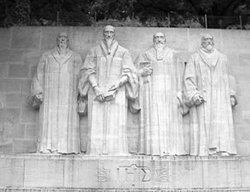 on of the Protestant Church. On an August day one summer, I was sitting on a bench in the park at Geneva. In front of me, and built against the ancient ramparts of the city, rose the great stone wall of the International Monument of the Reformation . In the center, cut out of the rock, stood the figures of the four Reformers who had to do with Geneva [pictured, right]— Calvin, Farell, Beza, and Knox. Along the wall to the left stood the great Elector Frederick, William the Silent, and Admiral Coligny. On the right, Roger Williams and Cromwell. between the different figures, were sculptured scenes representing memorable incidents of Reformation and post-Reformation times : Henry the IV, signing the Edict of Nantes; John Knox, preaching before Mary Stuart; the Elector Frederick receiving the French refugees, and the signing of the compact in the cabin of the Mayflower. Over all, cut in great letters was the familiar motto of the Reformation, “Post Tenebras Lux.” It is a noble memorial, and the stern faces of the Reformers, and the stirring scenes of Reformation history sum up the tremendous religious and political revolution which created a new world and a new Church.
on of the Protestant Church. On an August day one summer, I was sitting on a bench in the park at Geneva. In front of me, and built against the ancient ramparts of the city, rose the great stone wall of the International Monument of the Reformation . In the center, cut out of the rock, stood the figures of the four Reformers who had to do with Geneva [pictured, right]— Calvin, Farell, Beza, and Knox. Along the wall to the left stood the great Elector Frederick, William the Silent, and Admiral Coligny. On the right, Roger Williams and Cromwell. between the different figures, were sculptured scenes representing memorable incidents of Reformation and post-Reformation times : Henry the IV, signing the Edict of Nantes; John Knox, preaching before Mary Stuart; the Elector Frederick receiving the French refugees, and the signing of the compact in the cabin of the Mayflower. Over all, cut in great letters was the familiar motto of the Reformation, “Post Tenebras Lux.” It is a noble memorial, and the stern faces of the Reformers, and the stirring scenes of Reformation history sum up the tremendous religious and political revolution which created a new world and a new Church.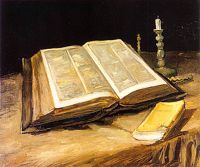 What are some of the characteristics of the present Protestant drift? How can we describe the change which has come over so many of our Protestant Churches? Perhaps we can best commence by saying that Protestantism is losing its faith in the Bible, and as it loses its faith in the Bible, it is losing its religion.
What are some of the characteristics of the present Protestant drift? How can we describe the change which has come over so many of our Protestant Churches? Perhaps we can best commence by saying that Protestantism is losing its faith in the Bible, and as it loses its faith in the Bible, it is losing its religion. The Gospel of this new Christianity is another Gospel because it gives us another Cross and another way of salvation. The Atonement, to quote the words of Turretin [pictured], is “the chief part of our salvation, the anchor of Faith, the refuge of Hope, the rule of Charity, the true foundation of the Christian religion, and the richest treasure of the Christian Church. So long as this doctrine is maintained in its integrity, Christianity itself, and the peace and happiness of all who believe in Christ, are beyond the reach of danger. But if it is rejected, or in any way impaired, the whole structure of the Christian faith must sink into decay and ruin.” But the new Gospel of Protestantism has no Atonement in it. The death of Christ on the Cross was but the last incident, though touching and pathetic, in the life and ministry of Jesus. The main thing about Christ was not His death, but His life. If His death meant anything, it was a beautiful instance of submission to the will of God, the highwater mark of sacrifice, or a last appeal to man to repent and turn to God. It is true, and fortunately true, that the Atonement still survives in the great hymns of the Church, in the liturgies and rubrics of its services, and in the two great sacraments, Baptism and the Lord’s Supper. But beyond this, one would hardly dare to say that the Atonement, the central fact of Christianity, is widely taught or proclaimed. In a perusal of forty-four sermons preached recently in metropolitan pulpits, there was but one mention of sin, and that was in a sermon in St. Patrick’s Cathedral. The pastor of the Waldensian Church in Rome, on a visit to this country last spring, read in the newspapers on the Monday following Easter excerpts of the sermons preached on Easter Sunday. He said to me that the thing which surprised him and amazed him was the almost total disregard for distinctive Christian doctrine, especially the great doctrine of the Resurrection. The one exception, he said, was a sermon preached by a Roman Catholic.
The Gospel of this new Christianity is another Gospel because it gives us another Cross and another way of salvation. The Atonement, to quote the words of Turretin [pictured], is “the chief part of our salvation, the anchor of Faith, the refuge of Hope, the rule of Charity, the true foundation of the Christian religion, and the richest treasure of the Christian Church. So long as this doctrine is maintained in its integrity, Christianity itself, and the peace and happiness of all who believe in Christ, are beyond the reach of danger. But if it is rejected, or in any way impaired, the whole structure of the Christian faith must sink into decay and ruin.” But the new Gospel of Protestantism has no Atonement in it. The death of Christ on the Cross was but the last incident, though touching and pathetic, in the life and ministry of Jesus. The main thing about Christ was not His death, but His life. If His death meant anything, it was a beautiful instance of submission to the will of God, the highwater mark of sacrifice, or a last appeal to man to repent and turn to God. It is true, and fortunately true, that the Atonement still survives in the great hymns of the Church, in the liturgies and rubrics of its services, and in the two great sacraments, Baptism and the Lord’s Supper. But beyond this, one would hardly dare to say that the Atonement, the central fact of Christianity, is widely taught or proclaimed. In a perusal of forty-four sermons preached recently in metropolitan pulpits, there was but one mention of sin, and that was in a sermon in St. Patrick’s Cathedral. The pastor of the Waldensian Church in Rome, on a visit to this country last spring, read in the newspapers on the Monday following Easter excerpts of the sermons preached on Easter Sunday. He said to me that the thing which surprised him and amazed him was the almost total disregard for distinctive Christian doctrine, especially the great doctrine of the Resurrection. The one exception, he said, was a sermon preached by a Roman Catholic.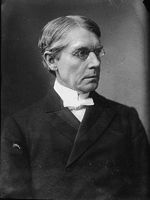 In September, 1891, Dr. Francis L. Patton [pictured, left] delivered the funeral sermon over his colleague in the Seminary at Princeton, Dr. Wistar Hodge. The whole address shows Dr. Patton in one of his most tender moods, and as it is one of the few literary remains of Dr. Patton, it is all the more precious. In his address, Dr. Patton foresaw the struggle in which we are engaged today. He said: “Dr. Hodge knew that the attack upon Calvinism through the new theology was made by bringing Paul’s teaching to the test of human feeling. He saw that the attack consisted not so much in denying Paul said what is alleged, but that his opinions are not necessarily binding upon us. Minimizing the authority of Paul, however, leads to minimizing the Gospel story, — ends in reducing Christianity to the religion of the individual conscience — ends in naturalism. He saw this: and because he saw, or thought he saw, that the Church was blind, and her leaders blind he was depressed and saddened.
In September, 1891, Dr. Francis L. Patton [pictured, left] delivered the funeral sermon over his colleague in the Seminary at Princeton, Dr. Wistar Hodge. The whole address shows Dr. Patton in one of his most tender moods, and as it is one of the few literary remains of Dr. Patton, it is all the more precious. In his address, Dr. Patton foresaw the struggle in which we are engaged today. He said: “Dr. Hodge knew that the attack upon Calvinism through the new theology was made by bringing Paul’s teaching to the test of human feeling. He saw that the attack consisted not so much in denying Paul said what is alleged, but that his opinions are not necessarily binding upon us. Minimizing the authority of Paul, however, leads to minimizing the Gospel story, — ends in reducing Christianity to the religion of the individual conscience — ends in naturalism. He saw this: and because he saw, or thought he saw, that the Church was blind, and her leaders blind he was depressed and saddened. TO THE MEMBERS OF THIS GRADUATING CLASS:
TO THE MEMBERS OF THIS GRADUATING CLASS: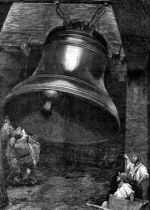 be your high honor to preach Christ where His name has never been heard, — wherever your lot is cast of God, let it be your solemn vow that your preaching shall be the kind which shall help to hand down to the generations unborn the grand and peculiar traditions of the Christian’s faith. On the northwest tower of St Paul’s in London hangs the great bell known as “Great Paul.” The bell bears this inscription, from the vulgate: “Vae mihi si non evangelisavero″—”Woe is me, if I preach not the Gospel!”
be your high honor to preach Christ where His name has never been heard, — wherever your lot is cast of God, let it be your solemn vow that your preaching shall be the kind which shall help to hand down to the generations unborn the grand and peculiar traditions of the Christian’s faith. On the northwest tower of St Paul’s in London hangs the great bell known as “Great Paul.” The bell bears this inscription, from the vulgate: “Vae mihi si non evangelisavero″—”Woe is me, if I preach not the Gospel!”